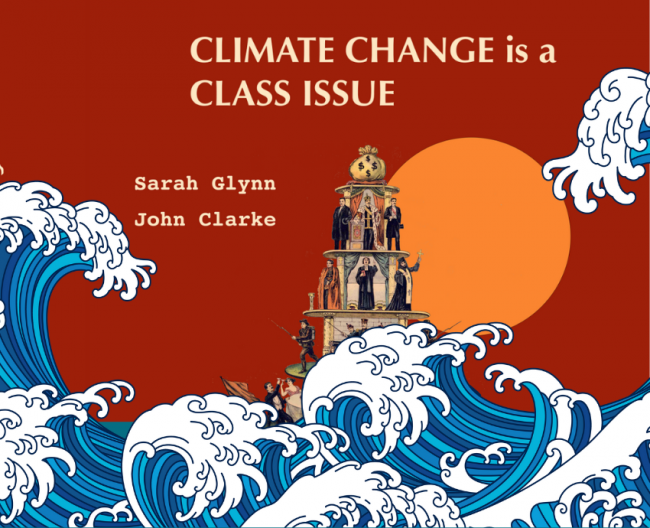Articles Menu

Nov. 29, 2024
Climate Change is a Class Issue
By Sarah Glynn and John Clarke
2024
68pp, RRP $25.95
Free e-book available from climateandclass.net
This small book has already earned big praise from British socialist filmmaker Ken Loach, who described it as “vital”.
Loach writes in appreciation: “Those who exploit the labour of others for profit also exploit the earth’s precious resources for the same reason. If you campaign to save the planet, join a picket line, and vice versa. The struggle doesn’t change — it is the class struggle, and this time we must win.”
The authors are socialist activists originally from Britain, but Sarah Glynn now writes for the Kurdish publication MedyaNews from Strasbourg, France, while John Clarke has been an anti-poverty activist in Ontario, Canada, since the 1970s.
Most climate activists are well aware that rich individuals, like rich countries, have the largest carbon footprints. However, while affluent lifestyles are part of the problem, this book explains that they are the smaller part of the problem. The bigger problem is where the rich invest the wealth that they don’t personally consume, in order to become even more wealthy or to preserve their hegemony: fossil fuels, wasteful production, war, etc.
“The reason for the mismatch between responsibility and suffering is the same for climate change and the wider environmental crisis as it is for all aspects of the world’s increasing and brutal inequality. It is the result of capitalism: of capitalism’s prioritisation of profit and its need for constant economic growth.
“Market competition means that no business can afford to be content with what it has, as it risks being overtaken by its competitors. It must find new markets and create new demand. It must persuade us to buy products and services we neither need nor truly want, at the expense of more and more of the world’s resources. Everything is regarded as a potential source of profit.
“Capitalism exploits nature in the same way that capitalism exploits the working class. How both are treated depends only on their potential to make money.”
Even the climate emergency, the book explains, “has been used as an opportunity for the wealthy to take back more of the world’s resources”.
“Always, there is pressure to preserve existing hierarchies and to extract more from working people. Politicians claim that they can combat climate change without disturbing the way our existing society functions. Their policies often end up penalising the less well-off while having little impact on carbon dioxide production. Some even cause production to increase.”
The book is not just an explanation of the link between capitalism and the climate crisis, it is also a short and down-to-earth primer on ecosocialism.
First, by clearly identifying capitalism as the problem and second, by laying out the brutal reality that most of us are forced to earn our living doing things that do not contribute much to humanity and often are at a great cost to the environment.
“This is what the capitalist system requires of us. We must never be happy with what we have, or we wouldn’t buy more. We work long hours, often on jobs that we can perceive are intrinsically pointless, and then spend our hard-won earnings on things that might save us a bit of time or seem to replace a bit of lost joy. We are caught on a treadmill that is designed to deprive us of both the time and the inclination to think beyond capitalist expectations.
“Most jobs do not contribute much to humanity, but workers doing those jobs are dependent on them for a living. They can’t afford to see their livelihood disappear. Capitalists exploit the fear of unemployment like they always do. They use this fear to make people resistant to any change that would see these jobs go.
“However, a sustainable social system requires work too, just different work. Such a system can pay people to do the work that their community decides is important, and it can ensure, through a fairer distribution of resources, that everyone has enough to live on and enough time to enjoy life.”
The solution to this contradiction, the book argues, lies in the democratisation of production and distribution.
“And what can make this happen if not the combined power of the working class?
“When the working class acts together, we get the power to take on the vested interests that are sending us all to hell in a handcart. In fact, this is our only hope.”
OK, good idea but how do we get there from where we are today?
The book sketches out a simple manifesto for change that is more of a framework than a detailed program, but it develops practical campaign demands and examples.
No spoilers from me. Download or buy the book and read it.
Better still, organise a reading circle and help grow more activist power for change in the process.